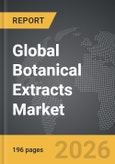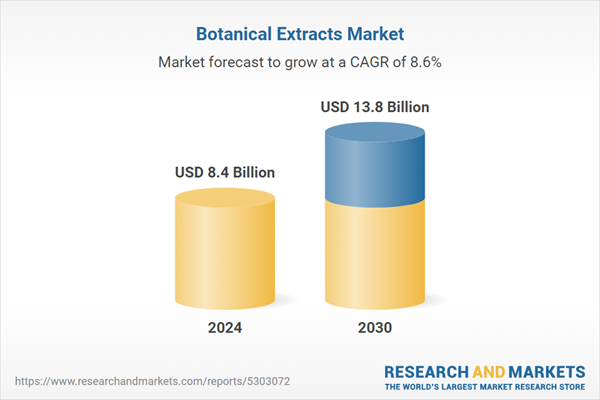Global Botanical Extracts Market - Key Trends & Drivers Summarized
How Are Botanical Extracts Evolving with Increasing Demand for Natural Products?
Botanical extracts are gaining significant attention across multiple industries due to the growing consumer preference for natural, plant-based products. Derived from various parts of plants such as roots, leaves, flowers, and seeds, botanical extracts are used in food and beverages, cosmetics, pharmaceuticals, and dietary supplements. As consumers become more conscious of the ingredients in their products, the demand for botanical extracts, which offer natural alternatives to synthetic additives and chemicals, is rising rapidly. This trend is particularly strong in the food and beverage industry, where botanical extracts are used to enhance flavor, preserve freshness, and add nutritional value to products.In the cosmetics and personal care industry, botanical extracts are increasingly sought after for their anti-inflammatory, antioxidant, and anti-aging properties. Consumers are gravitating towards natural skincare products free from harmful chemicals, and botanical extracts like aloe vera, green tea, and chamomile are being incorporated into formulations for their soothing and skin-enhancing benefits. Similarly, in the pharmaceutical and nutraceutical sectors, botanical extracts are being used to develop natural remedies and supplements, catering to the growing interest in holistic health and wellness. With advancements in extraction technologies, manufacturers are able to isolate and concentrate active compounds more efficiently, offering high-quality botanical extracts with enhanced efficacy and stability.
What Role Do Botanical Extracts Play in the Food and Beverage Industry?
In the food and beverage industry, botanical extracts serve as natural ingredients that enhance flavor, aroma, and nutritional content, while also providing functional benefits such as preservation and health enhancement. Consumers are increasingly seeking clean-label products that contain fewer artificial ingredients, and botanical extracts offer a natural solution. For example, extracts from spices, herbs, and fruits are used to add authentic flavors to beverages, snacks, and prepared meals, appealing to the health-conscious consumer. Vanilla, mint, turmeric, and cinnamon extracts are widely used in the industry to offer both flavor and potential health benefits, such as anti-inflammatory and antioxidant properties.In addition to flavor enhancement, botanical extracts also play a crucial role in product preservation. Extracts like rosemary and oregano are natural antioxidants that help extend the shelf life of food products by preventing oxidative degradation, which leads to spoilage. These natural preservatives are becoming more popular as manufacturers move away from synthetic preservatives that consumers often associate with health risks. The rise of functional beverages such as herbal teas, energy drinks, and plant-based milk has also driven demand for botanical extracts, as these products often contain plant-derived ingredients that are rich in vitamins, minerals, and antioxidants, adding both flavor and health benefits to the formulation.
How Are Botanical Extracts Impacting the Cosmetic and Pharmaceutical Industries?
Botanical extracts are having a transformative impact on the cosmetic and pharmaceutical industries, driven by growing consumer demand for natural, sustainable, and effective products. In the cosmetic industry, botanical extracts are valued for their ability to nourish, protect, and rejuvenate the skin. Extracts from plants like aloe vera, green tea, chamomile, and lavender are commonly used in skincare and haircare products for their soothing, moisturizing, and anti-inflammatory properties. Consumers are increasingly looking for clean-label beauty products free from harsh chemicals, and botanical extracts provide a natural and gentle alternative that aligns with the demand for eco-friendly and skin-friendly formulations.In the pharmaceutical industry, botanical extracts are being explored for their therapeutic potential in treating a variety of health conditions. Plants have been used in traditional medicine for centuries, and modern scientific research is uncovering the bioactive compounds in botanical extracts that can be harnessed for pharmaceutical applications. For example, turmeric extract (curcumin) is known for its anti-inflammatory and antioxidant properties, and it is being investigated for its potential in managing conditions such as arthritis and cardiovascular diseases. Similarly, ginseng, echinacea, and St. John's wort extracts are being used in natural remedies and supplements to boost immune health, reduce stress, and improve mental clarity. The rise of plant-based supplements and alternative medicine is further driving the demand for high-quality botanical extracts in the pharmaceutical sector.
What Factors Are Driving the Growth of the Botanical Extracts Market?
The growth in the botanical extracts market is driven by several factors, including the rising demand for natural and clean-label products, the growing interest in holistic health and wellness, and the increasing application of botanical extracts in a wide range of industries. Consumers are becoming more health-conscious and are seeking products with natural ingredients, particularly in the food, beverage, cosmetics, and pharmaceutical sectors. This shift away from synthetic additives and chemicals is propelling the demand for botanical extracts, which offer a natural alternative with both functional and therapeutic benefits.The expanding global trend towards sustainability and eco-friendly products is also contributing to market growth, as botanical extracts are perceived as more environmentally friendly compared to synthetic ingredients. Additionally, advancements in extraction technologies, such as supercritical CO2 extraction and cold-press extraction, are improving the efficiency and quality of botanical extracts, making them more accessible to manufacturers. The rise of the wellness movement, particularly in developed markets, is further driving consumer interest in botanical supplements and plant-based remedies for managing health and enhancing well-being. As consumers continue to prioritize natural and health-enhancing products, the botanical extracts market is expected to experience sustained growth.
Report Scope
The report analyzes the Botanical Extracts market, presented in terms of market value (US$ Thousand). The analysis covers the key segments and geographic regions outlined below.- Segments: Source (Spices, Flowers, Herbs, Leaves, Other Sources); Application (Food, Beverages, Pharmaceutical & Nutraceutical, Other Applications).
- Geographic Regions/Countries:World; United States; Canada; Japan; China; Europe (France; Germany; Italy; United Kingdom; and Rest of Europe); Asia-Pacific; Rest of World.
Key Insights:
- Market Growth: Understand the significant growth trajectory of the Spices Source segment, which is expected to reach US$4.8 Billion by 2030 with a CAGR of a 9.3%. The Flowers Source segment is also set to grow at 8.6% CAGR over the analysis period.
- Regional Analysis: Gain insights into the U.S. market, valued at $2.4 Billion in 2024, and China, forecasted to grow at an impressive 8.2% CAGR to reach $2.1 Billion by 2030. Discover growth trends in other key regions, including Japan, Canada, Germany, and the Asia-Pacific.
Why You Should Buy This Report:
- Detailed Market Analysis: Access a thorough analysis of the Global Botanical Extracts Market, covering all major geographic regions and market segments.
- Competitive Insights: Get an overview of the competitive landscape, including the market presence of major players across different geographies.
- Future Trends and Drivers: Understand the key trends and drivers shaping the future of the Global Botanical Extracts Market.
- Actionable Insights: Benefit from actionable insights that can help you identify new revenue opportunities and make strategic business decisions.
Key Questions Answered:
- How is the Global Botanical Extracts Market expected to evolve by 2030?
- What are the main drivers and restraints affecting the market?
- Which market segments will grow the most over the forecast period?
- How will market shares for different regions and segments change by 2030?
- Who are the leading players in the market, and what are their prospects?
Report Features:
- Comprehensive Market Data: Independent analysis of annual sales and market forecasts in US$ Million from 2024 to 2030.
- In-Depth Regional Analysis: Detailed insights into key markets, including the U.S., China, Japan, Canada, Europe, Asia-Pacific, Latin America, Middle East, and Africa.
- Company Profiles: Coverage of players such as BI Nutraceuticals, Blue Sky Botanics Ltd, Döhler GmbH, Frutarom Industries Ltd., Haldin Natural and more.
- Complimentary Updates: Receive free report updates for one year to keep you informed of the latest market developments.
Some of the 52 companies featured in this Botanical Extracts market report include:
- BI Nutraceuticals
- Blue Sky Botanics Ltd
- Döhler GmbH
- Frutarom Industries Ltd.
- Haldin Natural
- Kalsec Inc.
- Kuber Impex Ltd.
- Mb-Holding GmbH & Co. Kg
- Nutra Green Biotechnology Co., Ltd
- Prinova Group LLC.
This edition integrates the latest global trade and economic shifts into comprehensive market analysis. Key updates include:
- Tariff and Trade Impact: Insights into global tariff negotiations across 180+ countries, with analysis of supply chain turbulence, sourcing disruptions, and geographic realignment. Special focus on 2025 as a pivotal year for trade tensions, including updated perspectives on the Trump-era tariffs.
- Adjusted Forecasts and Analytics: Revised global and regional market forecasts through 2030, incorporating tariff effects, economic uncertainty, and structural changes in globalization. Includes historical analysis from 2015 to 2023.
- Strategic Market Dynamics: Evaluation of revised market prospects, regional outlooks, and key economic indicators such as population and urbanization trends.
- Innovation & Technology Trends: Latest developments in product and process innovation, emerging technologies, and key industry drivers shaping the competitive landscape.
- Competitive Intelligence: Updated global market share estimates for 2025, competitive positioning of major players (Strong/Active/Niche/Trivial), and refined focus on leading global brands and core players.
- Expert Insight & Commentary: Strategic analysis from economists, trade experts, and domain specialists to contextualize market shifts and identify emerging opportunities.
Table of Contents
Companies Mentioned (Partial List)
A selection of companies mentioned in this report includes, but is not limited to:
- BI Nutraceuticals
- Blue Sky Botanics Ltd
- Döhler GmbH
- Frutarom Industries Ltd.
- Haldin Natural
- Kalsec Inc.
- Kuber Impex Ltd.
- Mb-Holding GmbH & Co. Kg
- Nutra Green Biotechnology Co., Ltd
- Prinova Group LLC.
Table Information
| Report Attribute | Details |
|---|---|
| No. of Pages | 196 |
| Published | February 2026 |
| Forecast Period | 2024 - 2030 |
| Estimated Market Value ( USD | $ 8.4 Billion |
| Forecasted Market Value ( USD | $ 13.8 Billion |
| Compound Annual Growth Rate | 8.6% |
| Regions Covered | Global |









